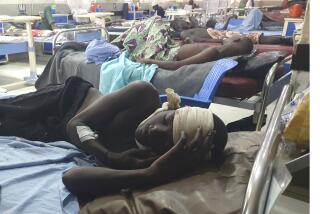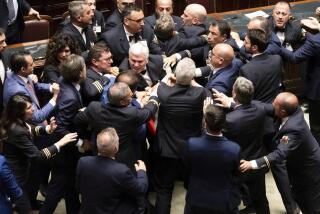NEWS ANALYSIS : Blasts Rock Italy at a ‘Delicate Moment’ : Terrorism: Five bombs in three months are seen as bid to destabilize nation at the crux of change.
Angry and bewildered, Italians are finding it easier to understand the intent than to guess the identity of the new breed of terrorists striking at the heart of their national, cultural and religious heritage.
Bombs that irreparably damaged two of Rome’s landmark churches Tuesday “struck a blow at the heart of Christianity,” in the words of Pope John Paul II.
But those explosions, plus one in Milan that claimed five lives and damaged a museum, also directly attacked Italy’s drive to radically overhaul a timeworn and corrupt political system.
Who did it? The Mafia, outraged at recent police successes? A political old guard, writhing at the prospect of losing its grip on power? The spiritual heirs of yesterday’s Red Brigades?
So far, there are only guesses.
“We’re following several lines of inquiry, both here and abroad,” Interior Minister Nicola Mancino told the Senate. “It is not improbable that many interests have come together to undermine the system comprehensively.
“We can also take into consideration the Mafia-terrorism trademark,” Mancino said after a Cabinet meeting Thursday, adding that this could also mean that there was “help, both from inside and outside of the country.” He noted a recent crackdown on Mafia money-laundering abroad, particularly in newly opened areas of Eastern Europe.
Whatever their source, the five bombs in the last three months that have battered icons in Rome, Milan and Florence have been weapons of political intimidation. In a country where consensus is often lacking, there is overwhelming agreement among political commentators and public figures that the bombs are aimed at destabilization.
“There is no doubt whatever that this represents an attack against (state institutions) and the government by forces wanting to create a power vacuum at such a delicate moment,” President Oscar Luigi Scalfaro said.
Prime Minister Carlo Azeglio Ciampi called the bombs “attempts to create disorder and panic to slow the country’s progress toward renewal.”
The terrorist goal seems to be to defuse unprecedented voter enthusiasm for political change after decades in which power was closely held by a handful of parties manipulating a series of weak coalition governments.
As police search for the perpetrators of the late-night attacks, Parliament is wrestling with an electoral reform law that would bring British-style, one-party one-candidate voting to Italy for the first time. Once the law is passed--probably by early August--elections by the end of the year would effectively redraw Italy’s political landscape for the first time since World War II. Most political parties are calling for elections by year’s end.
While Parliament debates reform, judges in Milan and Rome are stepping up incendiary inquiries into political and business corruption whereby payoffs to politicians were the common practice of industrialists keen to win state building and supply contracts. About 3,000 business and political figures have been implicated.
Reformers, strongly backed by everyday Italians, demand a new deal that will carry Italy into an era of majority elections instead of proportional representation--which gave more weight to parties than to people and issues; into new moral reform of industrial and political practices; toward more effective government capable of resolving crippling public debts.
“The terrorists are acting against the inevitable and the un-arrestable--the renewal of the country and the . . . revolution that is under way,” wrote editorialist Giorgio Bocca in the Rome daily La Repubblica on Thursday.
Many see the recent bombings, including the attack two months ago that destroyed part of the Uffizi Gallery in Florence, as primarily symbolic backlashes of an old guard delaying its substitution and ultimate defeat by reform.
Observed Milan’s new mayor, Marco Formentini, himself a figure of a changing Italy as a member of the infant federalist party the Northern League and its first leader of a major city: “In Rome, religion was the target, in Milan it was culture to get a bigger effect. . . . But I say enough of this macabre sense of ritual. . . . These bombings seem to me more of a punishment than an intimidation.”
Special correspondent Stobart reported from Rome and Times staff writer Montalbano from Bethesda, Md.
More to Read
Sign up for Essential California
The most important California stories and recommendations in your inbox every morning.
You may occasionally receive promotional content from the Los Angeles Times.










